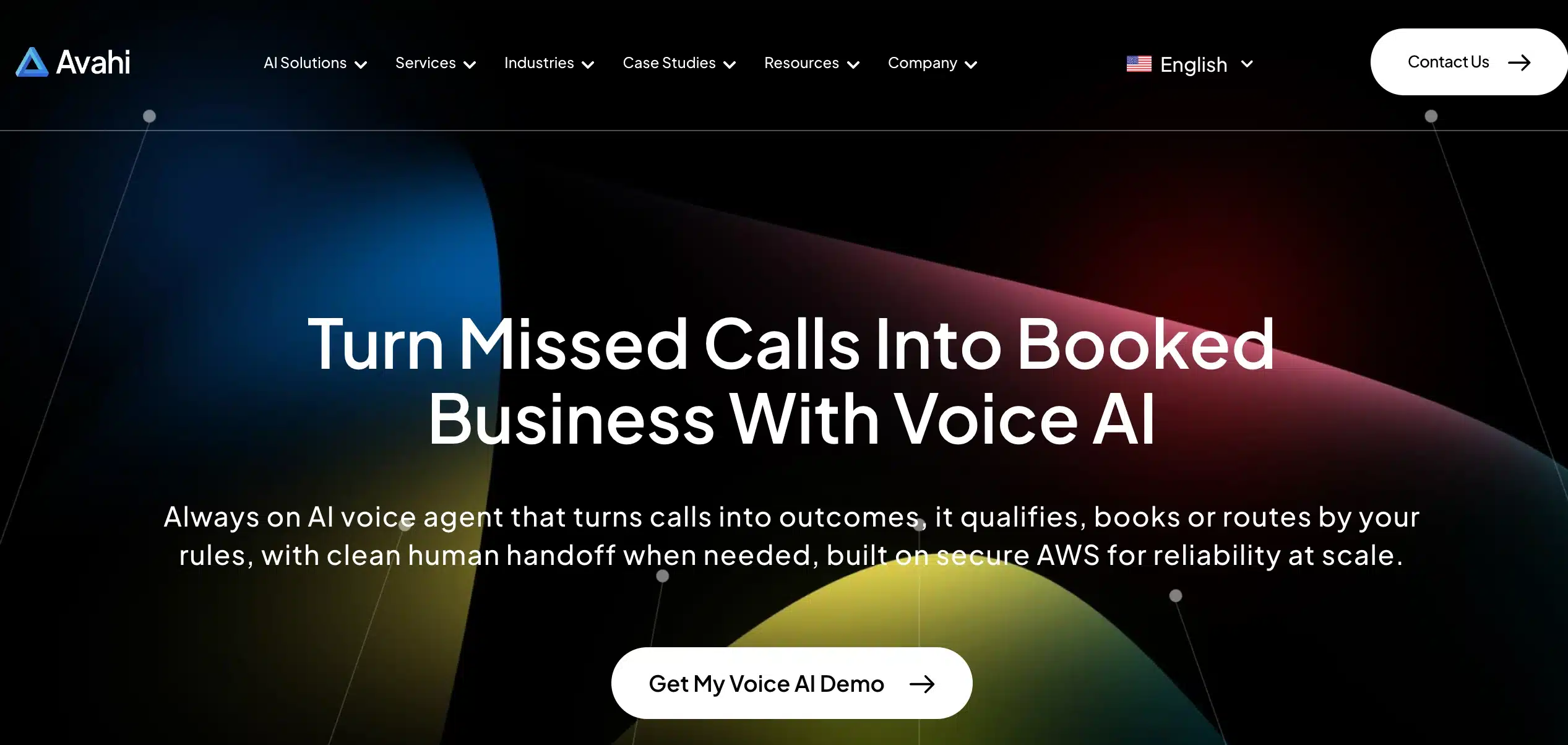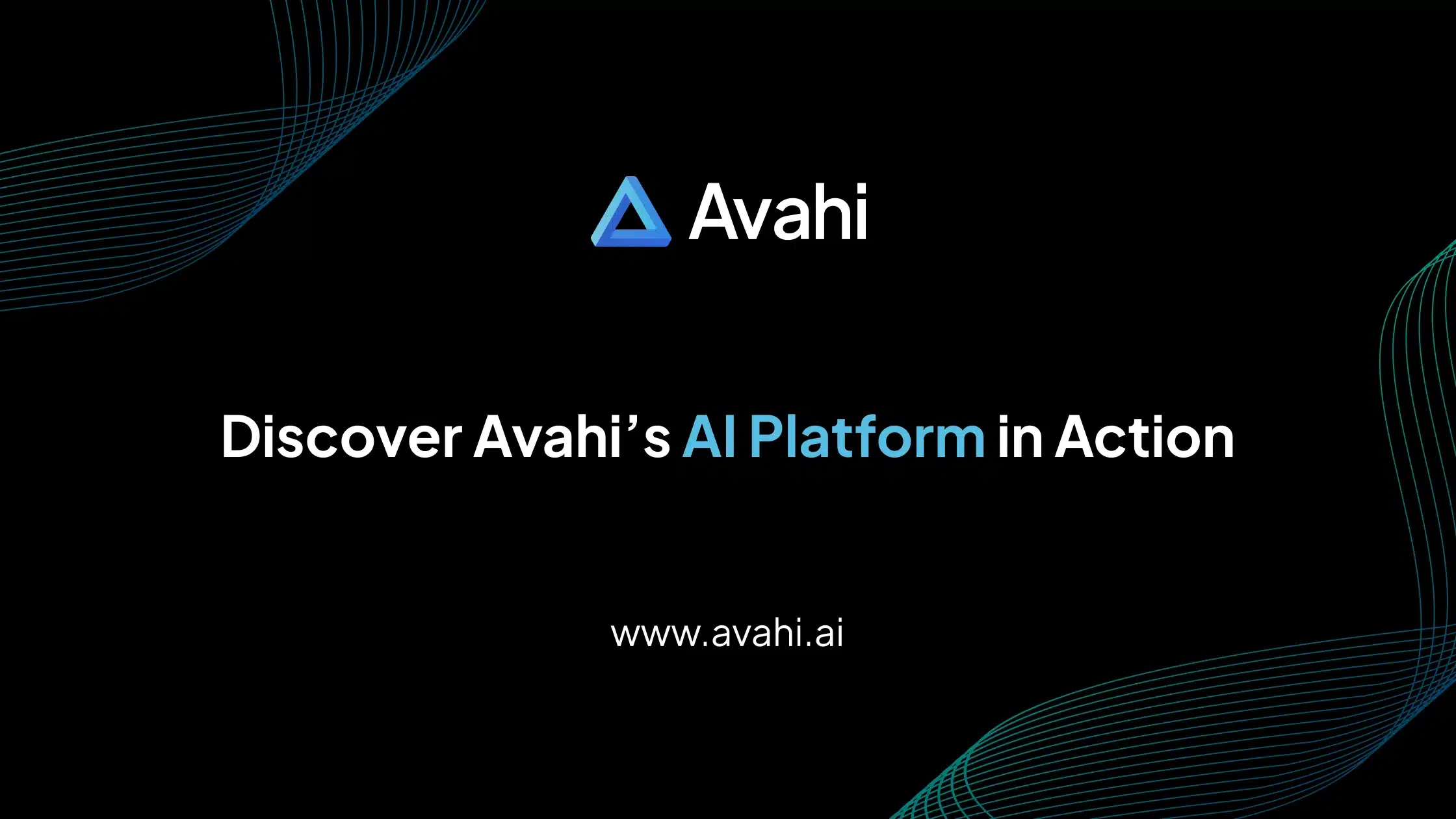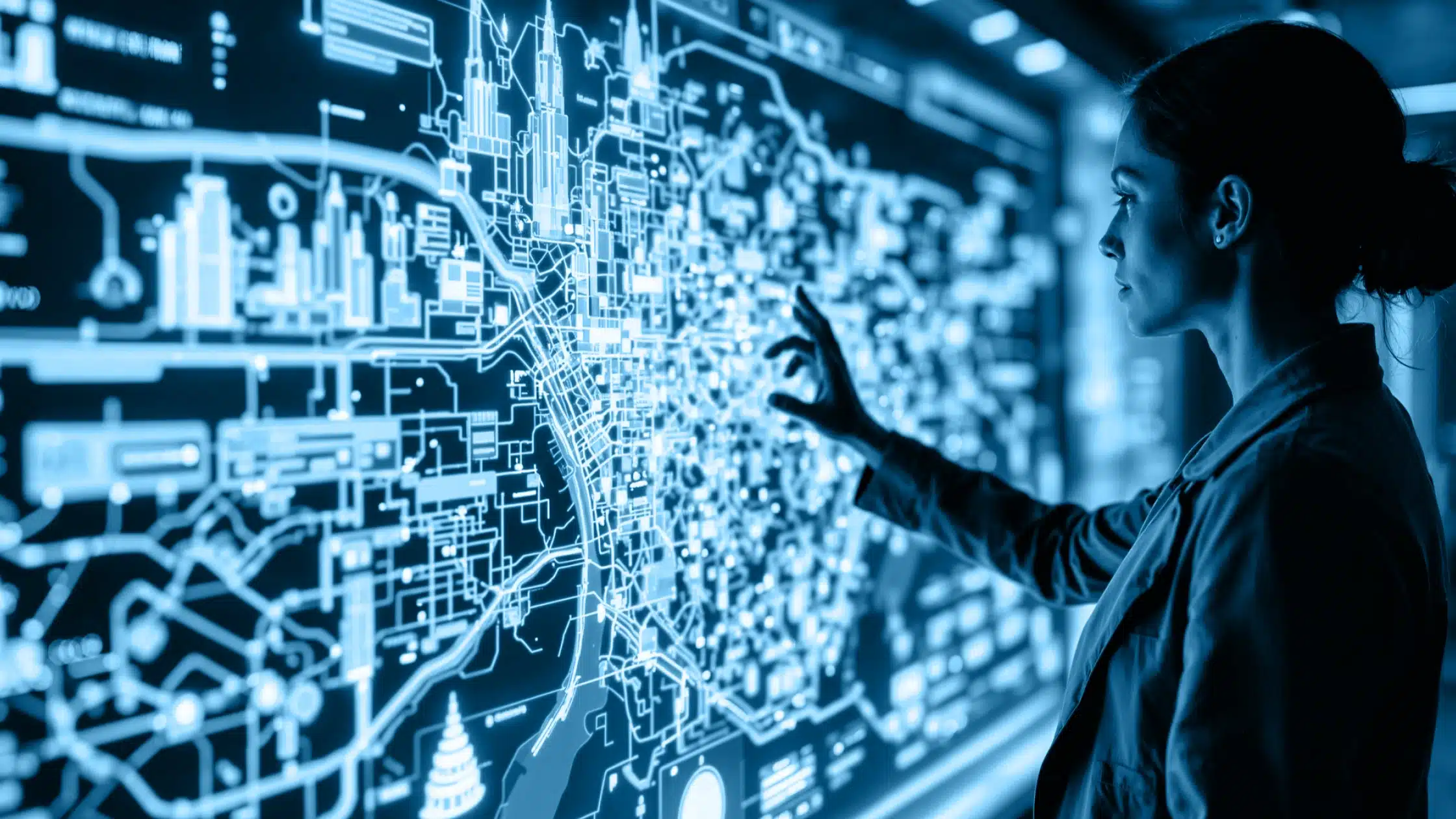You’re hiring under pressure. Too many applications, not enough time, and a growing demand to hire faster without compromising quality or fairness.
The conventional approach to conducting first-round interviews, scheduling calls, manually screening candidates, and chasing feedback is no longer suitable for today’s hiring volume and pace.
That’s where AI interviewers are changing the equation.
By 2025, nearly nine out of ten companies will be using AI in some aspect of their hiring process. A recent report indicates that 99% of hiring managers in the U.S. are utilizing AI tools, and 98% claim that it has enhanced efficiency. Meanwhile, the global AI recruitment market is expected to grow from $661 million in 2023 to over $1.1 billion by 2030.
It means the first-round interview is no longer just a screening step; it’s becoming a fully automated, data-driven checkpoint. It’s changing how fast you hire, how consistently you evaluate, and how your team spends its time.
This blog explores what an AI interviewer is, how it works, the core technologies behind it, its benefits and challenges, its real-world adoption in 2025, and what this means for your hiring strategy today.
TL;DR
|
What AI Interviewers Are and the Different Forms They Take
Hiring teams are under pressure. They’re swamped with applications, short on time, and expected to find the right candidate fast. First-round interviews often become rushed, inconsistent, and hard to scale.
For candidates, this stage can feel like a black box, marked by long waits, unclear outcomes, and a lack of feedback. AI interviewers are built to fix this.
An AI interviewer is software that conducts and evaluates early-stage job interviews without a human present. It asks questions, collects responses, analyzes data, and provides a score or recommendation based on predefined criteria.
It’s used to:
- Screen large volumes of applicants.
- Reduce time-to-hire.
- Standardize assessments across all candidates.
AI interviewers offer speed and consistency, but lack the human nuance that is often present early in the process.
Types of AI Interviewers
1. Text-Based Chatbots
These tools utilize natural language processing to simulate a written question-and-answer (Q&A) session. Candidates respond to questions through a chat interface. The AI scores answers based on keywords, structure, tone, and relevance.
These are commonly used in high-volume roles such as customer service and sales. While they are easy to deploy and mobile-friendly, they can’t capture vocal tone or emotion.
2. Voice-Interactive Systems
These operate like phone screenings, except the “interviewer” is AI. The system asks questions using a synthetic or pre-recorded voice.
The system analyzes speech patterns, pacing, hesitation, and word choice to assess communication skills. These are effective in roles where verbal delivery is essential. While they allow for rapid screening without coordination, some candidates report discomfort speaking to a machine.
3. Video-Based Interview Platforms
These are the most advanced formats. Candidates record answers to video prompts.
AI evaluates verbal content, tone, facial expressions, and body language to assess the overall sentiment.
This creates a much richer data set for assessing candidate suitability. These platforms are widely uin corporate and graduate hiring programs. However, they also raise more concerns about fairness, bias, and candidate privacy.
How AI Interviewers Function in Modern Hiring Workflows?
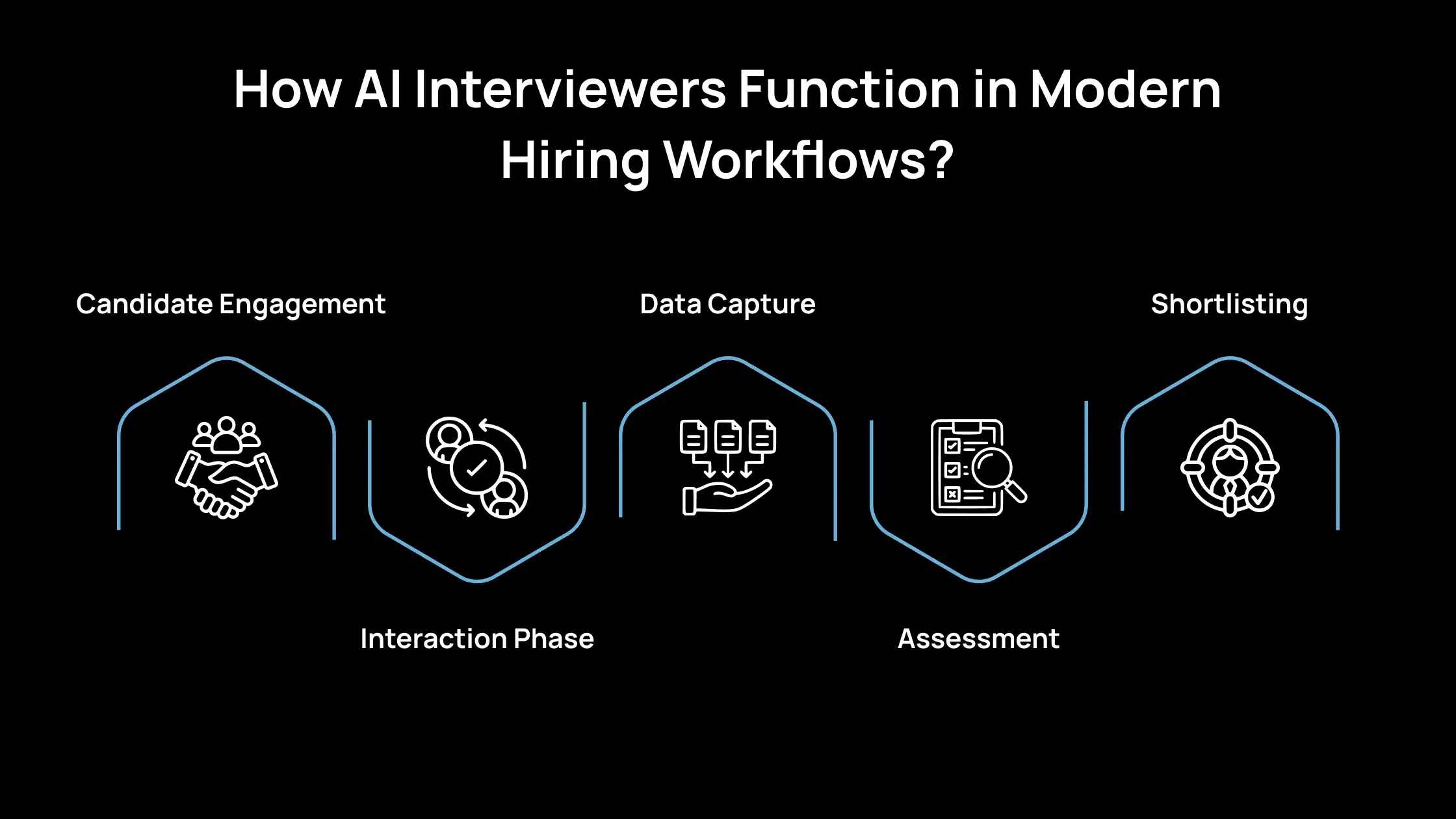
AI interviewers follow a structured, automated process designed to replace or support the first round of candidate screening. Below is a breakdown of how this workflow functions:
1. Candidate Engagement
Once a candidate applies for a role, they receive an invitation to participate in an AI-led interview. This usually comes through email or directly via the company’s job portal. The message includes a link to the interview platform, instructions, and a deadline.
- No human scheduler is involved.
- Candidates can complete the interview at their own convenience, within the designated time frame.
- The platform may also provide FAQs or a practice round to reduce friction.
2. Interaction Phase
The interview itself happens in one of three formats: text, voice, or video. The candidate is presented with a series of questions, either fixed or dynamically generated based on prior responses.
- Text interviews involve typing answers in a chat-style interface.
- Voice interviews require speaking into a mic, often on a phone or computer.
- Video interviews require candidates to record their answers using a webcam or similar device.
The AI collects these responses for further analysis. There is no live interviewer on the other side.
3. Data Capture
As the candidate responds, the AI captures multiple layers of data. Not just the content, but also how it’s delivered. Depending on the format, this may include:
- Verbal data: Words used, sentence structure, clarity, tone.
- Non-verbal data: Facial expressions, eye contact, head movement, speaking pace.
- Behavioral cues: Hesitations, filler words, or emotional signals.
This raw input becomes the basis for evaluation. The more sophisticated the AI system, the more data it can extract and process.
4. Assessment
The AI system then processes the data through pre-trained machine learning models. These models have been trained on thousands of past interviews and outcomes to predict which responses are linked to high performance in similar roles.
The system may:
- Score each response individually.
- Flag specific answers for follow-up.
- Create an overall candidate rating.
The evaluation is created to be consistent across candidates, reducing variation caused by human bias or fatigue.
5. Shortlisting
Once the assessment is complete, the scores are passed into the company’s Applicant Tracking System (ATS) or directly to the recruiter’s dashboard.
- Candidates above a certain threshold are marked for progression.
- Recruiters can sort and filter applicants based on scores.
- In some cases, feedback or automated rejection emails are sent to applicants who are not qualified for the position.
This step helps recruiters focus only on candidates who meet baseline requirements—saving time and ensuring a more objective process.
Assessment Criteria Used by AI Interviewers
AI interviewers evaluate candidates based on specific traits and indicators tied to job success. These often include:
- Communication Skills: Clarity, structure, vocabulary, and tone, all critical for client-facing or team roles.
- Role-Relevant Knowledge: Correctness, depth, and relevance of answers to technical or situational questions.
- Behavioral Patterns: Indicators like confidence, problem-solving approach, or emotional control.
- Cultural Fit Indicators: Alignment with company values, motivation, and working style, often inferred from language and tone.
These criteria are weighted differently depending on the role. For example, a sales role may emphasize verbal delivery, while a technical role may focus on logic and clarity of explanation.
Core AI Technologies That Drive Automated Interviews
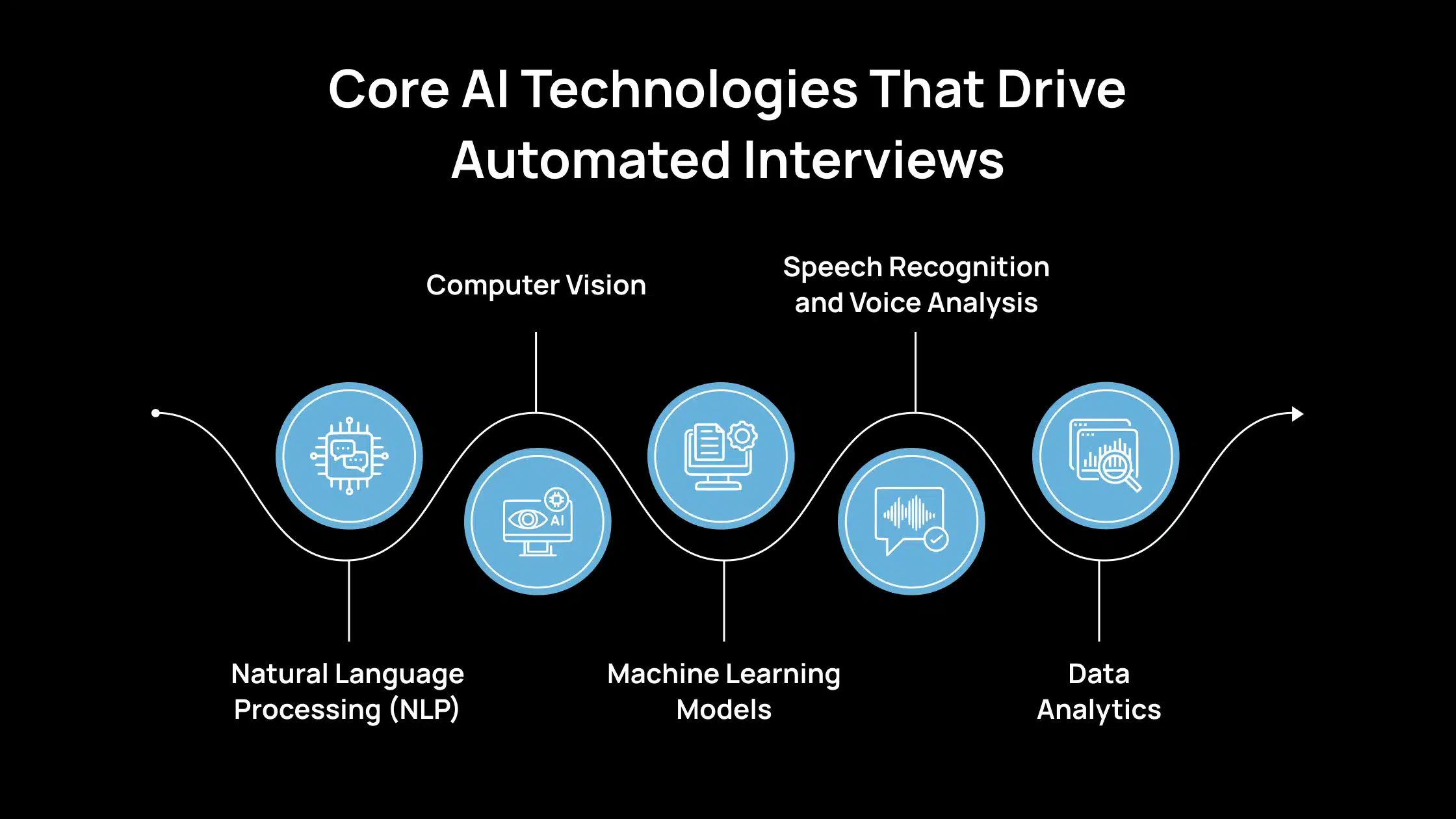
AI interviewers rely on a combination of advanced technologies to evaluate candidates efficiently and at scale. Each component plays a specific role in collecting, analyzing, and interpreting different aspects of a candidate’s response. Below is an explanation of some of the crucial technologies involved.
1. Natural Language Processing (NLP)
NLP enables the AI system to understand and analyze human language in both written and spoken forms. In the context of interviews, it is used to interpret sentence structure, grammar, and vocabulary, identify the intent behind responses, and detect sentiment, such as confidence or uncertainty.
For example, suppose a candidate is asked to explain a complex problem. In that case, NLP helps the system evaluate how clearly the idea is communicated and whether the answer stays relevant to the question.
2. Computer Vision
In video interviews, computer vision allows the AI to analyze visual cues from the candidate. It utilizes algorithms to detect and interpret facial expressions (e.g., smiling, frowning), eye movements, camera contact, head gestures, and posture changes.
These signals are used to infer emotional state, engagement level, and non-verbal communication. However, this technology raises important questions around accuracy and fairness, especially for neurodiverse candidates or those from diverse cultural backgrounds.
3. Machine Learning Models
Machine learning is the core engine behind the AI interviewer’s decision-making process. These models are trained on large datasets of past interviews and hiring outcomes to identify patterns that correlate with successful candidates.
They can predict job performance based on response patterns, rank candidates by comparing them to historical benchmarks, and continuously improve as more data is collected.
However, the quality of the model depends on the data it’s trained on. Poor or biased training data can lead to flawed evaluations.
4. Speech Recognition and Voice Analysis
Speech recognition converts spoken responses into text, which can then be analyzed using NLP. Beyond transcription, voice analysis looks at tone and emotional cues, speech fluency and pacing, pitch variation, and signs of hesitation.
This helps assess communication skills, confidence, and emotional control. For roles that involve speaking or presentations, these factors carry more weight in the scoring process.
5. Data Analytics
Once all inputs are collected, data analytics tools process and summarize the results. This involves aggregating scores across different categories and comparing candidate performance against benchmarks.
These analytics enable quick filtering of applicants and provide a data-driven basis for decision-making. They also help in tracking trends over time and adjusting the screening process when needed.
AI Recruiter vs. Human Recruiter in First-Round Hiring
The table below compares how AI recruiters and human recruiters handle first-round hiring, highlighting the differences in speed, consistency, and decision-making.
| Criteria | AI Recruiter | Human Recruiter |
| Speed | Immediate processing | Slower, time-bound |
| Consistency | Uniform scoring | Subject to bias and fatigue |
| Bias Mitigation | Can reduce or reinforce | Prone to unconscious bias |
| Scalability | High: thousands of candidates | Low: limited by human bandwidth |
| Empathy & Nuance | Lacks emotional intelligence | Better contextual understanding |
The Role of an AI Interviewer in First-Round Hiring
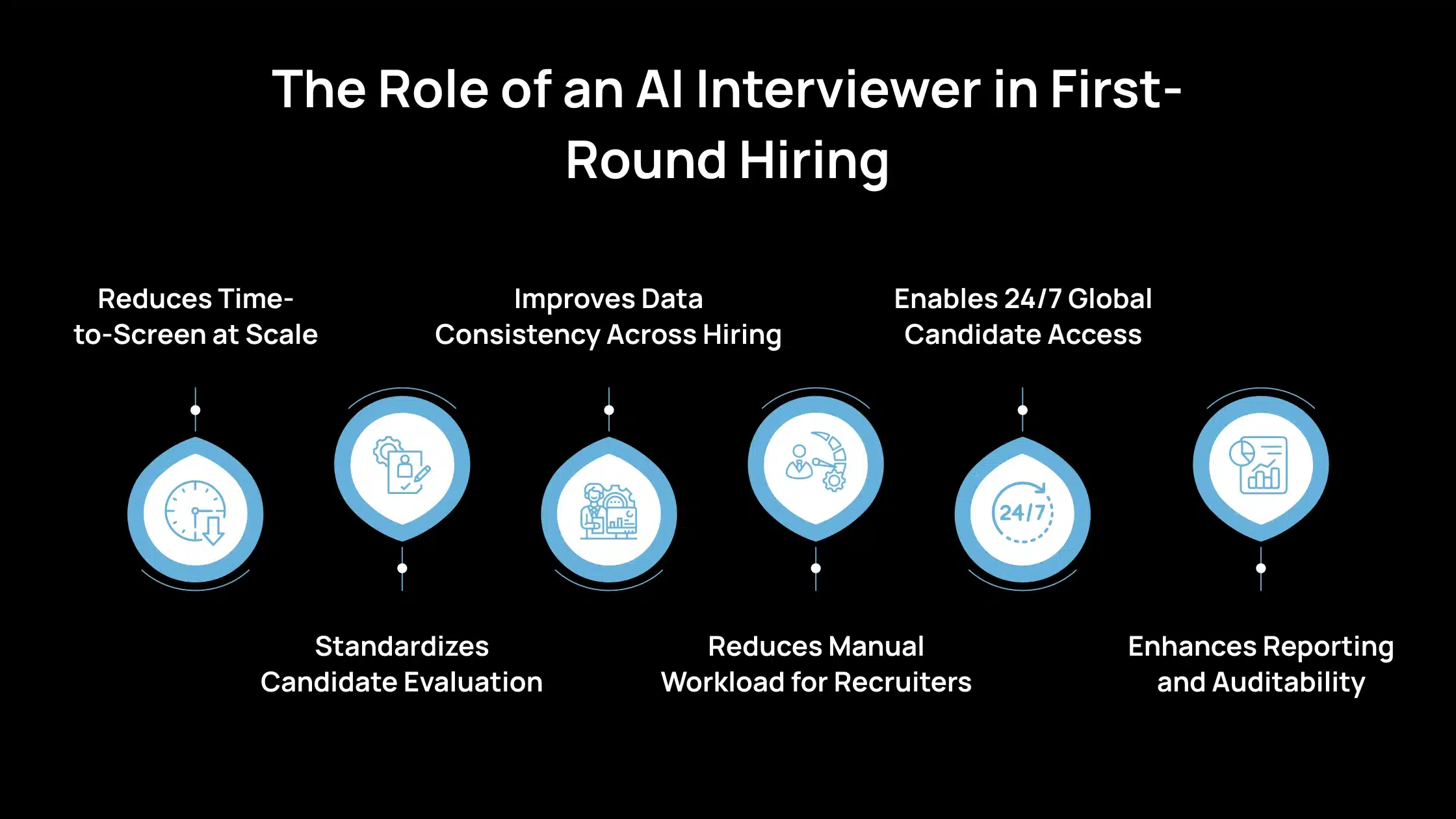
AI interviewers have become a central part of the early-stage hiring process. They don’t replace recruiters, but they significantly change how the first round is executed. For hiring teams, this means less manual screening, more structured data, and faster decision-making. Here’s how:
1. Reduces Time-to-Screen at Scale
Manual screening can’t keep up with the volume of applications most teams receive today. AI interviewers solve this by handling interviews asynchronously.
Candidates complete interviews at their convenience, eliminating the need for back-and-forth scheduling. AI scores and processes responses instantly. Recruiters spend time only on candidates who pass defined thresholds. This results in faster screening cycles and fewer bottlenecks at the top of the hiring funnel.
2. Standardizes Candidate Evaluation
Every candidate gets the same set of questions and the same scoring model. This reduces variation caused by different interviewers, moods, or scheduling contexts.
AI enforces consistency in both questions and evaluation criteria. Human error, fatigue, or bias during first-round interviews is reduced. Hiring teams can compare candidates more reliably. This means a more uniform and fair screening process across all applicants.
3. Improves Data Consistency Across Hiring
AI interviewers generate structured data for each candidate, including scores, timestamps, flagged responses, and other relevant information. This creates a standardized format that integrates easily with ATS and HR dashboards.
Data is searchable, auditable, and exportable. Recruiters and hiring managers can review the same data points. This helps in aligning hiring decisions with organizational KPIs.
4. Reduces Manual Workload for Recruiters
Much of the admin work in early hiring, scheduling, screening, and note-taking is eliminated.
AI interviewers automate initial outreach, reminders, and assessments. Recruiters focus on higher-value tasks, such as candidate engagement and final interviews.
Teams can handle more roles or requisitions without additional headcount. This results in a more efficient use of recruiter time and lower operational overhead.
5. Enables 24/7 Global Candidate Access
AI interviewers don’t work business hours. They’re always on. Global candidates can conduct interviews at their convenience, in their own time zones.
Companies can run hiring campaigns across regions without delay. No waiting for the interviewer’s availability.
6. Enhances Reporting and Auditability
Every AI interview generates data that can be tracked and analyzed for insights. Audit trails are built into the platform, recording who conducted the interview, when it was conducted, and how it was scored.
Hiring compliance is easier to maintain and prove. Performance of interview questions or models can be tracked over time. This results in stronger oversight and easier alignment with compliance and DEI goals.
Challenges and Limitations of AI Interviewers You Should Know
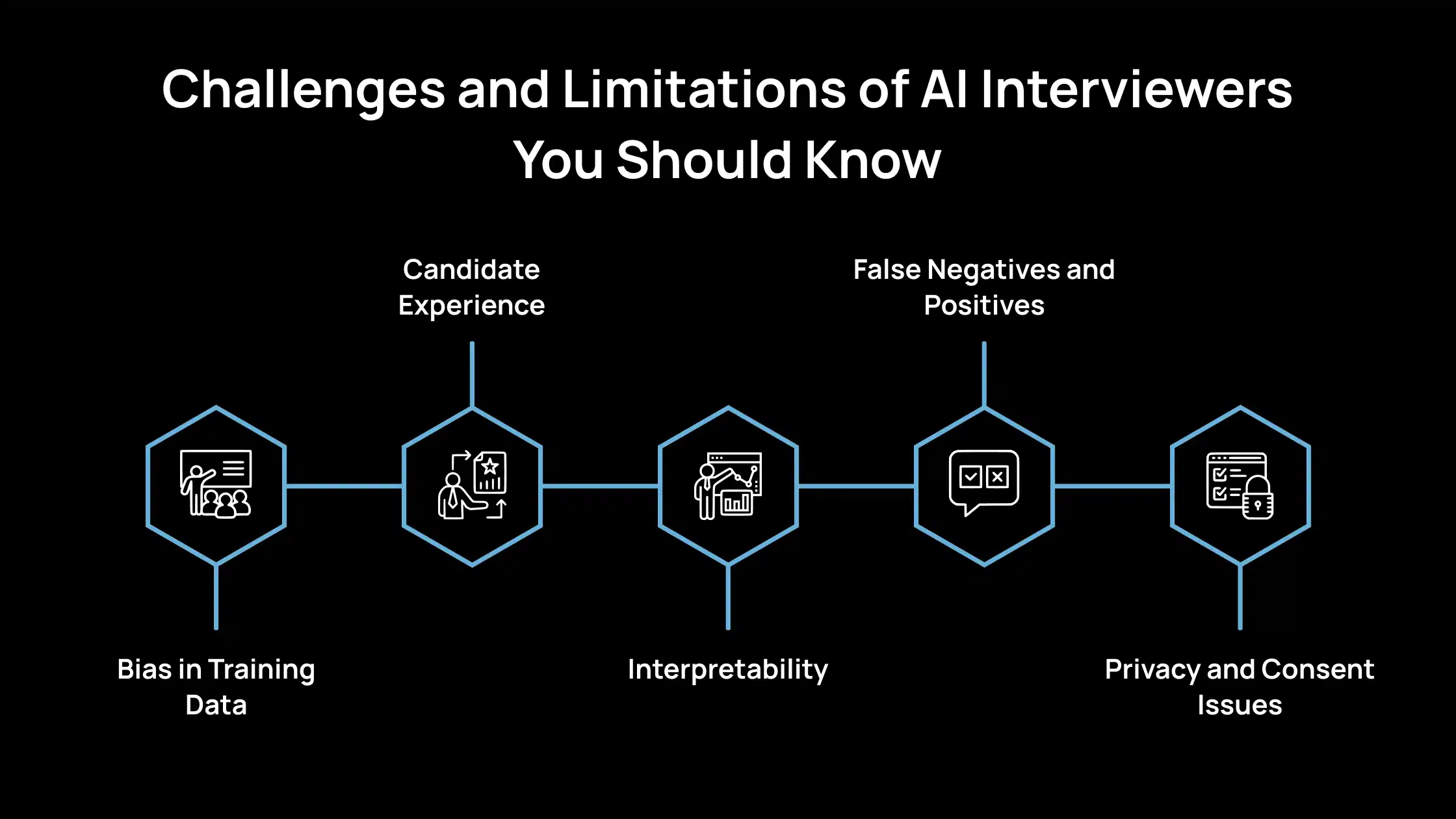
While AI interviewers improve speed and scale in first-round hiring, they come with specific limitations that organizations must consider. These challenges impact both the quality of hiring decisions and the candidate experience. Understanding these risks is critical for teams implementing or scaling AI-based screening systems.
1. Bias in Training Data
AI systems learn from historical data. If that data reflects biased hiring practices, such as favoring certain schools, accents, or communication styles, the model can perpetuate those biases.
- Bias can be baked into how success is defined in training datasets.
- Certain groups may be unfairly scored lower, even if qualified.
- Bias mitigation requires regular audits and re-training with diverse data.
Fairness isn’t guaranteed just because a system is automated. Bias must be monitored continuously.
2. Candidate Experience
Some candidates report that AI interviews feel impersonal or stressful, especially when there’s no human interaction at any point.
- There’s no real-time feedback or clarification during the interview.
- Candidates unsure of how they’re being judged may feel anxious or confused.
- A poor experience at this stage can harm employer branding, especially for in-demand talent.
While efficient for the company, the candidate-side experience needs to be carefully designed.
3. Interpretability
Many AI models, especially those utilizing deep learning, provide limited transparency into how final scores are calculated.
- Recruiters may struggle to explain why one candidate was selected over another.
- Lack of explainability raises compliance and trust.
- It becomes increasingly challenging to defend hiring decisions in the event of disputes or audits.
Organizations should prioritize systems with interpretable scoring or clear model documentation.
4. False Negatives and Positives
AI systems can misjudge candidates, especially those who don’t present well on camera or have non-standard communication styles.
- A qualified candidate might score poorly due to nerves, lighting, or technical glitches.
- Conversely, a well-spoken candidate may receive a high score despite lacking substance.
- The system doesn’t always detect nuance, especially in edge cases.
AI interview results should support, not replace, deeper evaluation and human judgment.
5. Privacy and Consent Issues
AI interviewers often collect sensitive data: voice recordings, facial expressions, and behavioral cues.
- This data must be stored securely and in compliance with privacy laws (e.g., GDPR, CCPA).
- Candidates must be clearly informed about how their data is used and how long it is retained.
- Facial recognition in particular raises legal and ethical concerns in certain jurisdictions.
Legal and IT teams must ensure AI tools meet all regulatory and data governance requirements.
Real-World Usage of AI Interviewers Across Regions and Sectors
Here’s how AI interviewers are being adopted across the world in 2025:
1. Unilever (Consumer Goods)
Unilever partnered with platforms such as HireVue and Pymetrics to revamp its campus and entry-level hiring processes. They processed about 250,000 applications annually through AI‑driven video interviews and gamified assessments.
This resulted in a 75% reduction in time-to-hire, cost savings of over £1 million per year, and approximately 50,000 hours of candidate interview time saved. This demonstrates how a large global employer uses AI interview technologies at scale.
2. HireVue (HR‑Tech Provider)
HireVue’s case studies, across various clients (e.g., retail, education), demonstrate reductions in hiring time (e.g., 60% less) and improvements in candidate completion and recruiter throughput when video interviews and AI scoring are utilized. This highlights the vendor side: how technology enables the deployment of AI interviewers.
How to Evaluate AI Interviewer Use in Your Sector and Hiring Workflow
|
How Avahi AI Voice Agents Support First-Round Recruitment For Your Organization?
In high-volume hiring, the first round often breaks down due to delays, including missed calls, unanswered queries, and slow scheduling. These gaps can cost you strong candidates. That’s where Avahi’s AI Voice Agent fits directly into your first-round interview process.
Avahi acts as your always-on, voice-enabled front line. It handles inbound candidate calls, qualifies interest, answers common questions, and automatically books interview slots. It can even route priority calls to recruiters when human input is needed.
For talent teams working across time zones or managing hundreds of applicants, this means:
- No more missed opportunities due to off-hours or unavailable recruiters.
- Faster response cycles for every candidate interaction.
- Fewer repetitive tasks, like confirming availability or sending reminders.
Avahi integrates with your existing ATS or CRM, so every interaction is logged, every candidate is tracked, and your recruiters stay focused on high-impact conversations. The result: smoother first-round screening and a more responsive candidate experience—without increasing headcount.
Discover Avahi’s AI Platform in Action
At Avahi, we empower businesses to deploy advanced Generative AI that streamlines operations, enhances decision-making, and accelerates innovation—all with zero complexity.
As your trusted AWS Cloud Consulting Partner, we empower organizations to harness the full potential of AI while ensuring security, scalability, and compliance with industry-leading cloud solutions.
Our AI Solutions Include
- AI Adoption & Integration – Leverage Amazon Bedrock and GenAI to Enhance Automation and Decision-Making.
- Custom AI Development – Build intelligent applications tailored to your business needs.
- AI Model Optimization – Seamlessly switch between AI models with automated cost, accuracy, and performance comparisons.
- AI Automation – Automate repetitive tasks and free up time for strategic growth.
- Advanced Security & AI Governance – Ensure compliance, detect fraud, and deploy secure models.
Want to unlock the power of AI with enterprise-grade security and efficiency? Start Your AI Transformation with Avahi Today!
Frequently Asked Questions
1. What is an AI interviewer, and how does it work?
An AI interviewer is an automated system that conducts and evaluates first-round job interviews using technologies like natural language processing and machine learning. It analyzes candidate responses, via text, voice, or video, to assess communication skills, job fit, and other criteria.
2. How is an AI recruiter different from a traditional recruiter?
An AI recruiter automates tasks like resume screening, interview scheduling, and candidate assessments. While a human recruiter provides strategic judgment and personal interaction, the AI recruiter handles repetitive and high-volume tasks to improve speed and consistency.
3. Is AI candidate screening accurate and fair?
AI candidate screening can offer consistent evaluations when properly trained and audited. However, it depends on the quality of the data and model used. Bias and transparency are ongoing concerns, so regular oversight is essential to maintain fairness and compliance.
4. Which companies are using AI interviewers in 2025?
Companies like Unilever, Vodafone, and Hilton use AI interviewers for early-stage hiring. These tools are widely adopted across the tech, retail, logistics, and customer service sectors to handle high applicant volumes efficiently.
5. What are the pros and cons of using AI for first-round interviews?
AI interviewers enhance speed, streamline manual screening, and deliver structured data. However, they may lack empathy, face bias issues, and create a less personal candidate experience. Balancing automation with human review is crucial to the effective implementation of any system.

